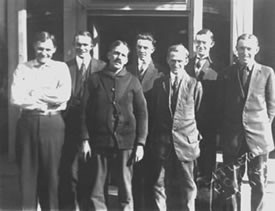Harry Knight

Littleton Post Office staff, c.1916. Left to right: Harry Knight; Fred Binner, assistant postmaster; Alex Johnson, R.R. carrier; Earl Downing; William Getschow, R.R. carrier; Edward H. Albertson, Postmaster; Ralph Duncan.
Harry Knight, born on March 5, 1853, came to Denver when he was only 17, in 1870. Not much is known about his early years, but in 1878, he married Eleanor Emily Lomax. They had two children, Edith and Harold. In 1889, the family moved to Littleton. Mrs. Knight was a talented musician and often entertained at the local Women's Club.
Harry Knight raised bees as his career and he believed that Colorado was the best place to produce honey. Knight served as the State Bee Inspector and as secretary to the State Bee Keepers Association. He was also director of the Colorado Agricultural Company in Littleton. In 1890, the Littleton Independent interviewed him about the state of manufacturing honey and the prospects for the future. Knight stated that the Colorado Agricultural Company was completing a two-story building that would house bee-keeping supplies. A separate stone house and cellar would house the bees over the winters. Knight was planning on purchasing 1,000 bee colonies to set up a bee keeping business. Five beekeepers would be hired who would each take care of 200 colonies. Knight said that the alfalfa grown in abundance around Littleton and in many areas of Colorado was the best food source for bees. In the eastern United States, there was too much rain and the clover blossoms were not as good as alfalfa, according to Knight.
An important political issue in the 1890s was the "silver question". Harry felt strongly that the silver standard should remain and joined the "People's Caucus" in Littleton. He was chosen the chairman, with Will Little as secretary. A list of the resolutions of the Caucus was printed in the Littleton Independent, and included that the group was in favor of good government, free coinage of silver, enforcement of the town ordinance of the liquor question, in favor of sidewalks and other improvements.
Harry Knight died on January 1, 1927 at the age of 73. He died at home in Littleton of cancer. Knight had been active in the Odd Fellows Lodge and the Woodmen of the World.
Bibliography
Littleton (Colo.) Independent. The Littleton Independent Publishers, 1888-.
Littleton Museum. Vertical File.
Photographs courtesy of the Littleton Museum unless otherwise noted. To order copies, contact the museum at 303-795-3950.
Compiled by Rebecca Dorward
Edited by Phyllis Larison and Lorena Donohue
Updated March 2021 by Phyllis Larison